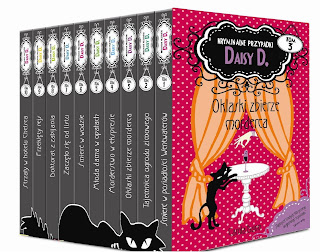My Daisy Dalrymple mysteries are now coming out in Poland. The Polish publisher bought the translation rights to the first 10, and I gather they're putting out one a week. This is the cover of the first, Death at Wentwater Court:
Cute and eye-catching, if somewhat inaccurate as far as the story's concerned. Very different from the original cover:
and the large print:

Not to mention the equally cartoonish US paperback:
Or the audio and two German editions each with different artwork!
They're calling the series Daisy D. I wonder if Dalrymple is impossible for Polish-speakers to pronounce.
There seems to be a boxed set of all 10. I'm not sure exactly how this works. Perhaps readers can buy the box along with one book and fill it as they come out? Or perhaps once all of them are out, they'll start selling the boxed set already filled. This box has the cover of the second in the series, The Winter Garden Mystery.
The spines of the volumes are very clever, producing a cat that strongly reminds me of the Pink Panther, which also adorns all three front covers that I've seen. Here's the third, Requiem for a Mezzo:
Interesting--especially as I can't remember ever writing about a cat in any of the Daisy books. There may be a casual mention somewhere in the 21 I've written to date, but I'm a dog-person and so is Daisy! Her stepdaughter's dog, Nana, appears in several of the books, finding a body in one and digging up a Clue in another, only to run away with it and rebury it. Nana even graces one cover:

With the help of friends and relatives, I've managed to put a welcome message in Polish on my website. A couple of days later I got more than twice as many hits than ever before--though I can't tell whether there were a lot of Poles!
While on the subject of cover art, I'm thrilled that the artist who's done so many great covers for Daisy (including Black Ship, above, but not Wentwater Court) is passing through town today and we're hoping to arrange to meet. I'm trying to decide which is my favourite, in case he asks.











